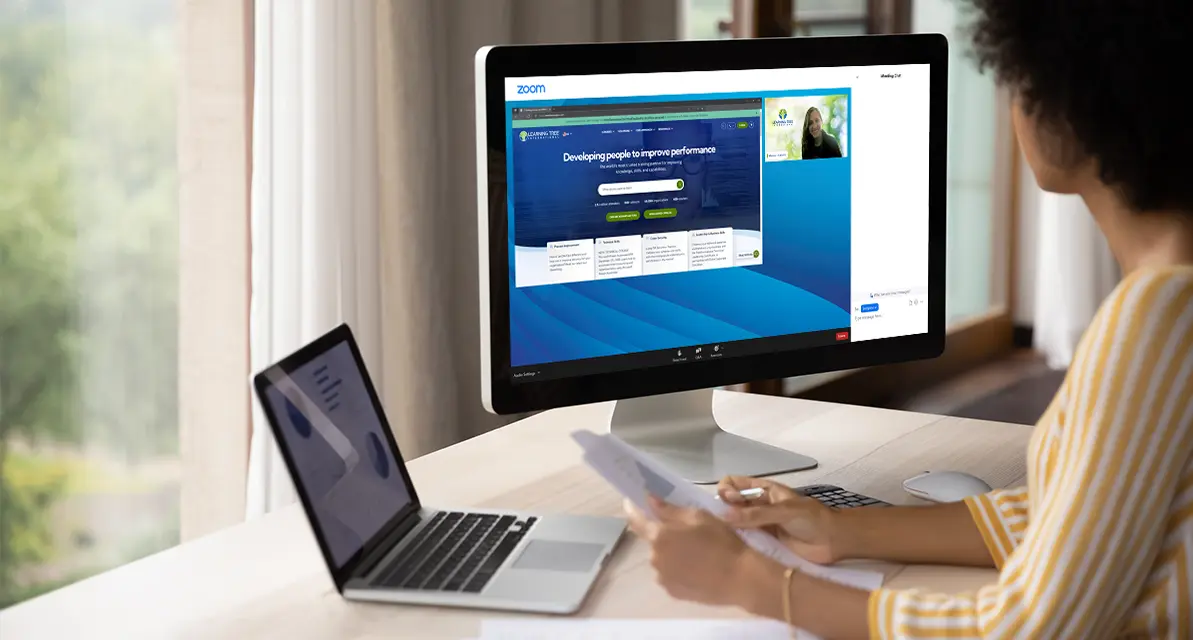2-Day Instructor-Led Training
After-course coaching available
Learning Tree end-of-course exam included
-
Guaranteed to Run - You can rest assured this class will not be canceled. Delivery format is subject to change – please call Customer Service if you have any questions.Feb 23 - 24 9:00 AM - 5:00 PM ESTVirtual
-
Guaranteed to Run - You can rest assured this class will not be canceled. Delivery format is subject to change – please call Customer Service if you have any questions.Mar 2 - 3 9:00 AM - 5:00 PM ESTHerndon, VA or Virtual
-
Mar 23 - 24 10:00 AM - 6:00 PM EDTVirtual
-
Apr 27 - 28 11:00 AM - 7:00 PM EDTAurora, CO or Virtual
-
May 6 - 7 9:00 AM - 5:00 PM EDTHerndon, VA or Virtual
-
May 11 - 12 9:00 AM - 5:00 PM EDTToronto or Virtual
-
May 19 - 20 10:00 AM - 6:00 PM EDTAustin or Virtual
-
Jun 1 - 2 9:00 AM - 5:00 PM EDTNew York or Virtual
-
Jun 15 - 16 9:00 AM - 5:00 PM EDTOttawa or Virtual
-
Jun 29 - 30 9:00 AM - 5:00 PM EDTWashington, DC or Virtual
-
Jul 22 - 23 12:00 PM - 8:00 PM EDTBellevue, WA or Virtual
-
Jul 27 - 28 9:00 AM - 5:00 PM EDTHerndon, VA or Virtual
-
Aug 4 - 5 9:00 AM - 5:00 PM EDTToronto or Virtual
-
Aug 10 - 11 10:00 AM - 6:00 PM EDTAustin or Virtual
-
Aug 24 - 25 9:00 AM - 5:00 PM EDTNew York or Virtual
-
Sep 8 - 9 9:00 AM - 5:00 PM EDTOttawa or Virtual
-
Sep 28 - 29 9:00 AM - 5:00 PM EDTWashington, DC or Virtual
-
Oct 13 - 14 11:00 AM - 7:00 PM EDTAurora, CO or Virtual
-
Oct 19 - 20 9:00 AM - 5:00 PM EDTHerndon, VA or Virtual
-
Oct 26 - 27 9:00 AM - 5:00 PM EDTToronto or Virtual
-
Nov 2 - 3 10:00 AM - 6:00 PM ESTAustin or Virtual
-
Nov 16 - 17 9:00 AM - 5:00 PM ESTNew York or Virtual
-
Nov 30 - Dec 1 9:00 AM - 5:00 PM ESTOttawa or Virtual
-
Dec 14 - 15 9:00 AM - 5:00 PM ESTWashington, DC or Virtual
-
Jan 4 - 5 12:00 PM - 8:00 PM ESTSan Francisco or Virtual
-
Jan 11 - 12 9:00 AM - 5:00 PM ESTHerndon, VA or Virtual
-
Jan 19 - 20 9:00 AM - 5:00 PM ESTToronto or Virtual
-
Jan 25 - 26 10:00 AM - 6:00 PM ESTAustin or Virtual
-
Feb 8 - 9 9:00 AM - 5:00 PM ESTNew York or Virtual
Scroll to view additional course dates





